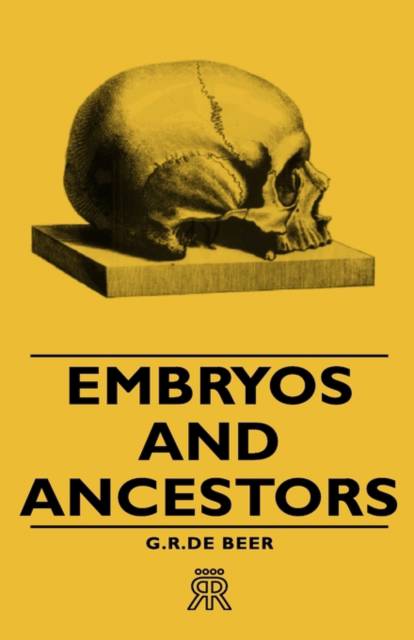
Bedankt voor het vertrouwen het afgelopen jaar! Om jou te bedanken bieden we GRATIS verzending aan op alles gedurende de hele maand januari.
- Afhalen na 1 uur in een winkel met voorraad
- Gratis thuislevering in België
- Ruim aanbod met 7 miljoen producten
Bedankt voor het vertrouwen het afgelopen jaar! Om jou te bedanken bieden we GRATIS verzending aan op alles gedurende de hele maand januari.
- Afhalen na 1 uur in een winkel met voorraad
- Gratis thuislevering in België
- Ruim aanbod met 7 miljoen producten
Zoeken
Omschrijving
EMBRYOS AND ANCESTORS by G. R. DE BEER. PREFACE: TEN years ago I published a book under the title Embryology and Evolution, in which I made an attempt to show that after rejecting the theory of recapitulation, a much better synthesis could be made of our knowledge of embryonic development and evolutionary descent, opening up new fields for observation and co-ordination of studies in embryology, genetics, and evolution. This work has for some little time been out of print, and I have yielded to the demands of my friends to produce it again. During the intervening years a great deal of new evidence has become available, and these fresh data have fitted into place in my scheme like pieces of a puzzle, for I have seen no reason to alter the plan of my former book in the slightest degree. The present book is my previous one brought up to date and enlarged. I have recently been engaged in a study of the bearings of embryology on homology, taxonomy, and other special aspects of zoology. My views on these matters have been published in Evolution Essays presented to Professor E. S. Goodrich, edited by myself, and in The New Systematics, edited by J. S. Huxley. I have therefore not felt called upon to repeat them here, except in so far as they bear directly on the problem of the relations between embryology and evolution. It has been very encouraging to me to note the lively interest in these problems shown in recent years. The first necessity in Biology will always be further observation and experiment but as Dr. Woodger aptly points out, progress in thought is necessary as well. Outworn theories are not only dull in them selves, but they are actually harmful in thwarting the framing of new working hypotheses which take account of recent pro gress made in the various experimental branches of Biology. Such an outworn theory I believe Haeckels theory of recapitulation to be. I lay no claims to proficiency in metaphysics, and I have no doubt that many of my expressions will appear sinful to my philosophical friends. But I am aware of many of the dangers, and when I say that paedomorphosis does this, that, or the other I am merely saving time and space, and not endowing an abstract concept with the powers of a subject of a transitive verb. I should like to acknowledge my debt to M. Jean Rostand who translated my previous book into French. Few exercises are as helpful for testing the soundness of ones deductions and conclusions as the expression of them in another language. I wish likewise to record my indebtedness to Dr. J. S. Huxley, Professor W. Garstang, and Professor J. B. S. Haldane for their helpful criticism, and to Professor R. A. Fisher for very kindly reading the proofs. April 1940. G. R. DE B. Contents include: List of Illustrations . . . . ix I. Stages of Development and Stages of Evolution i II. Ontogeny . . . . . .10 III. Speeds of the Processes of Development . . 15 IV. Phylogeny . . . . . .22 V. Heterochrony and Phylogeny . . .27 VI. Caenogcnesis . . . . .32 VII. Deviation . . . . . .38 VIII. Neoteny . . . . . .46 IX. Vestigial Structures due to Reduction . . 58 X. Adult Variation . . . . .62 XI. Vestigial Structures due to Retardation . . 64 XM. Hypermorphosis . . . . .65 XIII. Acceleration . . . . .71 XIV. Paedomorphosis and Gerontomorphosis . . 78 XV. Repetition ...... 90 XVI. Conclusions . . . . . .96 XVII. Bibliography . . . . - 99 Index . . . . . .106
Specificaties
Betrokkenen
- Auteur(s):
- Uitgeverij:
Inhoud
- Aantal bladzijden:
- 132
- Taal:
- Engels
Eigenschappen
- Productcode (EAN):
- 9781443720663
- Verschijningsdatum:
- 4/11/2008
- Uitvoering:
- Hardcover
- Formaat:
- Genaaid
- Afmetingen:
- 140 mm x 216 mm
- Gewicht:
- 317 g

Alleen bij Standaard Boekhandel
+ 105 punten op je klantenkaart van Standaard Boekhandel
Beoordelingen
We publiceren alleen reviews die voldoen aan de voorwaarden voor reviews. Bekijk onze voorwaarden voor reviews.












